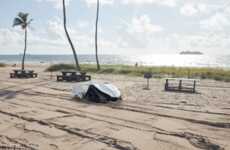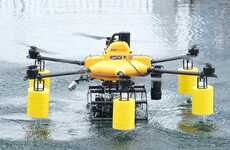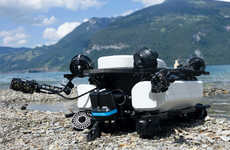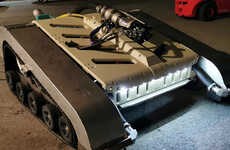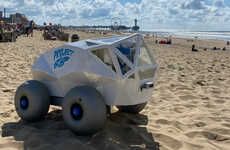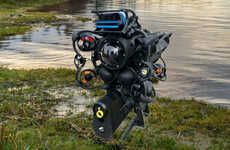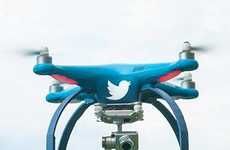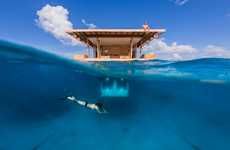
The Veolia Marine Drone Swims Around Collecting Trash in the Sea
Amelia Roblin — July 4, 2012 — Eco
References: behance.net & yankodesign
Sadly, humankind is not made up of staunch recyclers with environmentally responsible morals. The Veolia Marine Drone may be the sort of machine necessary to keep life on this planet clean and healthy, for all of the marketing in the world will not stop many from littering.
Conceived by a team of designers including Elie Ahovi of France, this pollution-gathering contraption is effectively a large motorized net that sweeps the sea in search of garbage and collects it through its broad opening. Ocean life such as fish is spared, thanks to the integration of sensors and an infrasound system. A whole fleet of Veolia Marine Drones can be sent down into the depths to amass plastic bags and bottles, remaining underwater for up to two weeks thanks to high-power batteries.
Conceived by a team of designers including Elie Ahovi of France, this pollution-gathering contraption is effectively a large motorized net that sweeps the sea in search of garbage and collects it through its broad opening. Ocean life such as fish is spared, thanks to the integration of sensors and an infrasound system. A whole fleet of Veolia Marine Drones can be sent down into the depths to amass plastic bags and bottles, remaining underwater for up to two weeks thanks to high-power batteries.
Trend Themes
1. Ocean Cleanup Drones - The development of drones specifically designed to clean up ocean pollution presents an opportunity for disruptive innovation in waste management and environmental conservation.
2. Sensor Technology Integration - The integration of sensors and infrasound systems in ocean cleaning drones creates an opportunity for disruptive innovation in marine conservation and preservation of aquatic ecosystems.
3. Advanced Battery Technology - The use of high-power batteries in marine drones enables extended underwater operations, presenting an opportunity for disruptive innovation in autonomous underwater exploration and environmental monitoring.
Industry Implications
1. Waste Management - The development and deployment of ocean cleanup drones offer disruptive innovation opportunities in waste management, particularly in the area of ocean pollution control.
2. Environmental Conservation - The use of sensor technology and drone systems for cleaning up the ocean presents disruptive innovation opportunities in the field of environmental conservation and sustainability.
3. Renewable Energy - The advancement of battery technology for extended underwater operations in marine drones has the potential for disruptive innovation in the renewable energy industry, particularly in battery storage solutions.
5.6
Score
Popularity
Activity
Freshness


